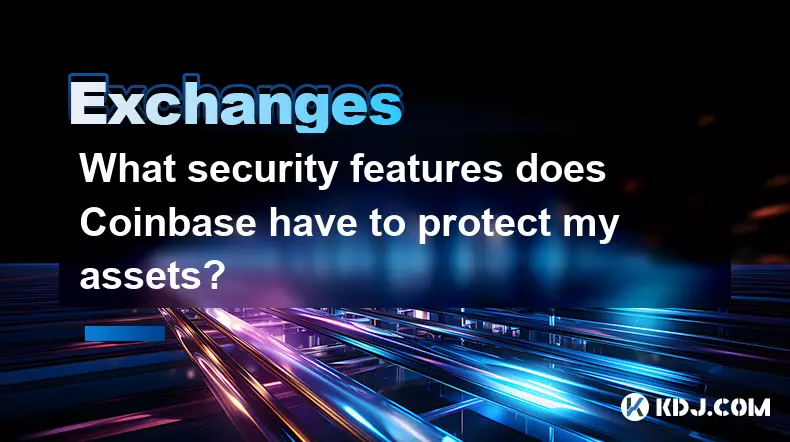-
 bitcoin
bitcoin $109523.663807 USD
-0.13% -
 ethereum
ethereum $4019.526508 USD
2.06% -
 tether
tether $1.000482 USD
0.00% -
 xrp
xrp $2.776815 USD
0.18% -
 bnb
bnb $958.942396 USD
0.12% -
 solana
solana $204.294698 USD
3.84% -
 usd-coin
usd-coin $0.999693 USD
0.00% -
 dogecoin
dogecoin $0.232115 USD
2.09% -
 tron
tron $0.338028 USD
0.84% -
 cardano
cardano $0.790920 USD
1.50% -
 hyperliquid
hyperliquid $44.871443 USD
5.60% -
 ethena-usde
ethena-usde $1.000322 USD
0.04% -
 chainlink
chainlink $21.034165 USD
2.60% -
 avalanche
avalanche $28.794831 USD
-0.54% -
 stellar
stellar $0.360466 USD
1.24%
What security features does Coinbase have to protect my assets?
Coinbase uses advanced encryption, cold storage, and multi-factor authentication to secure user assets, with 24/7 monitoring, insurance coverage, and compliance measures enhancing platform safety.
Sep 21, 2025 at 09:18 pm

Advanced Encryption and Secure Storage Protocols
1. Coinbase employs end-to-end encryption for all user data, ensuring that sensitive information such as passwords and private keys are never exposed during transmission. This encryption uses industry-standard TLS protocols to safeguard communications between users and the platform.
2. The majority of digital assets stored on Coinbase are kept in offline cold storage systems, which are isolated from the internet and therefore highly resistant to hacking attempts. These wallets are geographically distributed and secured with multiple layers of physical and digital protection.
3. Hardware security modules (HSMs) are used to manage cryptographic operations. These tamper-resistant devices store private keys and perform signing operations without ever exposing the key material, adding a critical layer of defense against unauthorized access.
4. Regular penetration testing is conducted by internal teams and third-party security auditors to identify vulnerabilities. Findings are addressed promptly, reinforcing the integrity of the platform’s infrastructure.
Multi-Factor Authentication and Access Controls
1. Users are required to enable multi-factor authentication (MFA) to access their accounts. Supported methods include authenticator apps, hardware security keys, and SMS-based verification, though the latter is discouraged due to SIM-swapping risks.
2. Role-based access control limits employee permissions based on job responsibilities. Only authorized personnel can access sensitive systems, and all actions are logged and monitored for anomalies.
3. Session management tools automatically log out inactive users and flag logins from unrecognized devices or locations, prompting additional identity verification steps.
Coinbase also implements IP monitoring and behavioral analytics to detect suspicious login patterns, triggering immediate alerts or temporary account holds when necessary.Insurance Coverage and Regulatory Compliance
1. Digital assets held in online storage are covered by crime insurance policies that protect against theft and cybersecurity breaches. While this does not cover losses due to user error, it provides a financial safety net for platform-level incidents.
2. Coinbase complies with regulatory standards such as KYC (Know Your Customer) and AML (Anti-Money Laundering) requirements, which help prevent fraudulent activity and ensure legal accountability.
3. The company undergoes regular audits by independent firms to verify asset reserves and operational transparency, reinforcing trust in its custodial practices.
All customer funds are accounted for through rigorous reconciliation processes, minimizing discrepancies and enhancing overall accountability.Fraud Detection and Incident Response
1. Real-time transaction monitoring systems analyze withdrawal requests and trading behavior for signs of fraud. Unusual activities, such as large transfers to new addresses, trigger manual reviews or automatic holds.
2. An internal security operations center (SOC) operates 24/7 to respond to threats. This team coordinates incident response, conducts forensic investigations, and deploys countermeasures during active attacks.
3. Customers receive instant notifications for critical actions like withdrawals or MFA changes, allowing them to react quickly if unauthorized activity occurs.
4. Coinbase collaborates with blockchain analysis firms to trace illicit transactions and recover stolen funds when possible, leveraging public ledger transparency to enhance security outcomes.
Frequently Asked Questions
Q: Does Coinbase provide private keys to users?A: No, Coinbase manages private keys on behalf of users through its custodial model. This means the platform controls the keys, but implements robust security measures to protect them.
Q: What happens if my email associated with Coinbase is compromised?A: If your email is hacked, an attacker could attempt password resets. However, without access to your enabled MFA method—especially a hardware key or authenticator app—they will be unable to gain full account access.
Q: Are my fiat deposits insured?A: Yes, U.S. dollar balances held in Coinbase are eligible for FDIC insurance up to $250,000 through partner banks, though this coverage applies only to cash, not cryptocurrencies.
Q: Can I withdraw my crypto to a personal wallet at any time?A: Yes, users can transfer their digital assets to external wallets at any time. Doing so allows you to hold private keys yourself, shifting responsibility for security to your own setup.
Disclaimer:info@kdj.com
The information provided is not trading advice. kdj.com does not assume any responsibility for any investments made based on the information provided in this article. Cryptocurrencies are highly volatile and it is highly recommended that you invest with caution after thorough research!
If you believe that the content used on this website infringes your copyright, please contact us immediately (info@kdj.com) and we will delete it promptly.
- Token Costs, AI Scaling, and Computing Power: The Quest for Efficiency
- 2025-09-27 14:25:15
- Qwen3Guard: A Leap Towards Multilingual AI Safety
- 2025-09-27 14:25:15
- Rare 1p Coin Could Fetch £200,000: Are You Holding a Fortune?
- 2025-09-27 12:25:13
- MAGACOIN Finance: Buzz, Risks, and the Altcoin Stampede
- 2025-09-27 12:25:13
- Crypto Wallets & Utility Tokens: What's the Hype?
- 2025-09-27 12:30:02
- Coin Memes, Pumpfun, and ChatGPT: Navigating the Wild West of Crypto
- 2025-09-27 14:30:01
Related knowledge

How can I get the latest cryptocurrency updates on Crypto.com?
Sep 26,2025 at 07:54am
Accessing Real-Time Crypto Market Data on Crypto.com1. Navigate to the Crypto.com website or open the mobile application to access live price charts a...

How can I use Crypto.com's market analysis tools?
Sep 23,2025 at 01:54am
Understanding Crypto.com’s Market Analysis Dashboard1. Accessing the market analysis tools begins with logging into your Crypto.com account through th...

How can I unlink my Crypto.com payment method?
Sep 23,2025 at 12:54am
Understanding Payment Methods on Crypto.com1. Crypto.com allows users to link various payment methods including credit cards, debit cards, and bank ac...

How does futures trading work on Crypto.com?
Sep 27,2025 at 06:37am
Futures Trading Mechanics on Crypto.com1. Futures trading on Crypto.com allows users to speculate on the future price of cryptocurrencies without owni...

How can I increase my Crypto.com account's withdrawal limit?
Sep 23,2025 at 10:37am
Understanding Withdrawal Limits on Crypto.com1. Crypto.com enforces withdrawal limits to enhance account security and comply with regulatory standards...

How can I check Crypto.com's cryptocurrency exchange rates?
Sep 26,2025 at 01:54am
Accessing Real-Time Crypto.com Exchange Rates1. Navigate to the official Crypto.com website or open the mobile application. Both platforms display liv...

How can I get the latest cryptocurrency updates on Crypto.com?
Sep 26,2025 at 07:54am
Accessing Real-Time Crypto Market Data on Crypto.com1. Navigate to the Crypto.com website or open the mobile application to access live price charts a...

How can I use Crypto.com's market analysis tools?
Sep 23,2025 at 01:54am
Understanding Crypto.com’s Market Analysis Dashboard1. Accessing the market analysis tools begins with logging into your Crypto.com account through th...

How can I unlink my Crypto.com payment method?
Sep 23,2025 at 12:54am
Understanding Payment Methods on Crypto.com1. Crypto.com allows users to link various payment methods including credit cards, debit cards, and bank ac...

How does futures trading work on Crypto.com?
Sep 27,2025 at 06:37am
Futures Trading Mechanics on Crypto.com1. Futures trading on Crypto.com allows users to speculate on the future price of cryptocurrencies without owni...

How can I increase my Crypto.com account's withdrawal limit?
Sep 23,2025 at 10:37am
Understanding Withdrawal Limits on Crypto.com1. Crypto.com enforces withdrawal limits to enhance account security and comply with regulatory standards...

How can I check Crypto.com's cryptocurrency exchange rates?
Sep 26,2025 at 01:54am
Accessing Real-Time Crypto.com Exchange Rates1. Navigate to the official Crypto.com website or open the mobile application. Both platforms display liv...
See all articles










































































